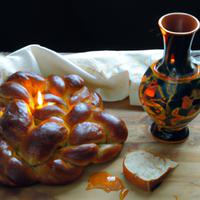
1 serving (50 grams) contains 175 calories, 4.5 grams of protein, 5.0 grams of fat, and 25.0 grams of carbohydrates.

Log this food in SnapCalorie

Nutrition Information
Calories |
875 | ||
|---|---|---|---|
% Daily Value* |
|||
| Total Fat | 25 g | 32% | |
| Saturated Fat | 5 g | 25% | |
| Polyunsaturated Fat | 0 g | ||
| Cholesterol | 125 mg | 41% | |
| Sodium | 750 mg | 32% | |
| Total Carbohydrates | 125 g | 45% | |
| Dietary Fiber | 5 g | 17% | |
| Sugars | 20 g | ||
| protein | 22.5 g | 45% | |
| Vitamin D | 0 mcg | 0% | |
| Calcium | 50 mg | 3% | |
| Iron | 6.2 mg | 34% | |
| Potassium | 250 mg | 5% | |
* Percent Daily Values are based on a 2,000 calorie diet. Your daily values may be higher or lower depending on your calorie needs.
Food Attributes
Source of Calories
About Homemade challah
Homemade challah is a traditional Jewish bread known for its soft, slightly sweet flavor and distinctive braided appearance. Commonly enjoyed during Shabbat and holidays, this bread has roots in Ashkenazi Jewish cuisine. The dough is typically made with flour, eggs, water, yeast, sugar, and a dash of salt, giving it a rich, tender texture. While challah is a comforting and celebratory food, its nutritional profile varies depending on the ingredients. It is a good source of carbohydrates and provides energy, with eggs contributing some protein and vitamins. However, its high sugar content and potential use of refined flour mean moderation is key for those monitoring their sugar intake or pursuing whole-grain options. To enhance its health aspects, some recipes substitute whole wheat flour or reduce sugar. Homemade challah can be a meaningful addition to meals, particularly when balanced with nutrient-rich sides.



